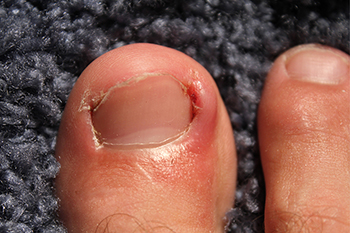
Ingrown toenails develop when the nail grows into the surrounding skin, or when the skin grows over the edge of the nail. A primary cause of ingrown toenails is improper nail trimming, such as cutting the nail and rounding the edges instead of cutting straight across. This may result in the nail curling under and digging into the skin, which often results in pain as well as potential for infection. Other risk factors for ingrown toenails are wearing shoes that squeeze the toes, engaging in activities that put pressure on the feet, and having foot abnormalities like bunions or hammertoes. People with a family history of ingrown toenails, diabetes, or poor circulation are also more susceptible. Symptoms often include redness, swelling, and pain, and if untreated, can progress to infection. A podiatrist can assess and treat the condition, using techniques to relieve pain and in severe cases removing part of the nail or nail bed. If you have a painful or infected ingrown toenail, it is suggested that you schedule an appointment with a podiatrist.
Ingrown toenails can become painful if they are not treated properly. For more information about ingrown toenails, contact Dr. David Ungar of Personal Foot Care. Our doctor can provide the care you need to keep you pain-free and on your feet.
Ingrown Toenails
Ingrown toenails occur when a toenail grows sideways into the bed of the nail, causing pain, swelling, and possibly infection.
Causes
- Bacterial infections
- Improper nail cutting such as cutting it too short or not straight across
- Trauma to the toe, such as stubbing, which causes the nail to grow back irregularly
- Ill-fitting shoes that bunch the toes too close together
- Genetic predisposition
Prevention
Because ingrown toenails are not something found outside of shoe-wearing cultures, going barefoot as often as possible will decrease the likeliness of developing ingrown toenails. Wearing proper fitting shoes and using proper cutting techniques will also help decrease your risk of developing ingrown toenails.
Treatment
Ingrown toenails are a very treatable foot condition. In minor cases, soaking the affected area in salt or antibacterial soaps will not only help with the ingrown nail itself, but also help prevent any infections from occurring. In more severe cases, surgery is an option. In either case, speaking to your podiatrist about this condition will help you get a better understanding of specific treatment options that are right for you.
If you have any questions please feel free to contact our office located in Farmington, MI . We offer the newest diagnostic and treatment technologies for all your foot and ankle needs.

